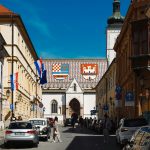Economic cooperation with China and the INA-MOL case will be the primary topics of discussion.
Croatian Prime Minister Andrej Plenković will visit Budapest on Monday and Tuesday, where he will attend the sixth meeting of the heads of the governments of central and eastern European countries and China, the so-called 16+1 Summit, which should be an excellent opportunity for strengthening economic cooperation between Croatia and China, reports Index.hr on November 27, 2017.
Chinese Prime Minister Li Keqiang will attend the summit with prime ministers of 16 European countries, and the main topic of the talks will be the development of economic relations – the member states of the initiative aims to strengthen and expand cooperation in a wide range of areas, including trade and investment, finance, agriculture, science and technology, health, education and culture.
In addition to taking part in the summit meeting, which will also include representatives of Albania, Bosnia and Herzegovina, Bulgaria, Czech Republic, Estonia, Hungary, Latvia, Lithuania, Macedonia, Montenegro, Poland, Romania, Slovakia, Slovenia and Serbia, Plenković will meet bilaterally with the Chinese Prime Minister. On Tuesday, he will also have a meeting with the host of the summit, Hungarian Prime Minister Viktor Orban.
At the same summit last year, which was then held in Riga, Croatia and China signed a memorandum of understanding on cooperation in the matter of ports and port industrial parks, which forms a framework for the possible entry of Chinese investors. The memorandum was a useful framework for China’s potential investments in infrastructure and transport in Croatia, said Plenković at the time.
In recent years, China has shown keen interest in boosting investment in Central and Southeast Europe. China has over 1.3 billion inhabitants, and last year its bilateral trade with these countries amounted to 58.7 billion dollars. Most of the Chinese investments have been focused on Hungary and Serbia, while no breakthroughs have been made so far in Croatia, with the exception of a 30 million euro investment in tourist potential of Krapinske Toplice. Therefore, the summit, as well as the bilateral meeting with the Chinese Prime Minister, could be an excellent opportunity for concrete moves and more specific plans.
During the second day of his visit to Hungary, Plenković will hold a bilateral meeting with Orban, where it is expected that two topics will be discussed: the INA and MOL issue, and the matter of Croatia’s membership in the Organization for Economic Co-operation and Development (OECD), which Hungary has recently blocked.
A month ago, the Swiss Federal Supreme Court refused to annul the UNCITRAL arbitration judgment which ruled that the evidence submitted by Croatia was insufficient to prove that the contracts concluded in 2009 by the Hungarian oil company MOL with regards to the Croatian oil company INA were the result of corrupt activities. That meant that Croatia had exhausted its legal options in the arbitration proceedings launched in 2014 with a request to annul the contracts on the management of INA.
The second arbitration proceedings between Croatia and MOL at the International Centre for the Settlement of Investment Disputes (ICSID) in Washington are still ongoing.
In the meantime, the media reported that Russia’s Rosneft was interested in buying MOL’s shares in INA. The head of the Russian oil company Igor Sechin said at the end of October that Croatia had a central position in Rosneft’s regional development strategy and that there were several reasons for it – from the strategic value of INA’s assets to the location of oil terminals through which Russian companies could sell their products in the region.
In September, Hungary quoted the situation with MOL’s investments in Croatia, as well as the treatment of its CEO Zsolt Hernady, who is being investigated by Croatia’s judiciary, as reasons for blocking Croatia’s membership in the OECD.
Translated from Index.hr.










